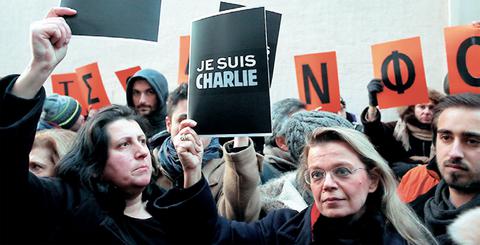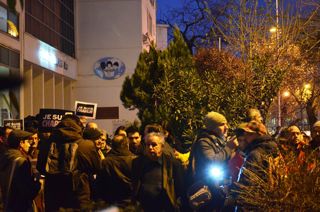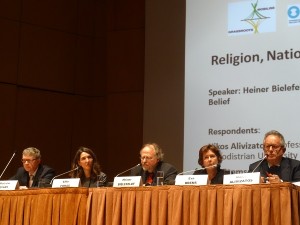Photos - French Cultural Institute in Athens and Thessaloniki and ELIAMEP
Simona Peneva
The terrorist attack on French satirical newspaper Charlie Hebdo that killed twelve people has provoked an unprecedented wave of sympathy and indignation among all people on the planet. They flooded the streets around the world to support freedom of speech, religious freedom, tolerance and to firmly say "no" to terrorism. Athens and Thessaloniki were no exception. Athenians had gathered outside the  French Institute, shouting "Je suis Charlie." Some of them were holding satirical newspaper Charlie Hebdo clippings, candles and posters. They stated, "We will not be afraid to say, write and draw what we want in the face of authoritarianism, call to religions, ideology or violence." Hundreds took part in the peaceful demonstration in Thessaloniki as well.
French Institute, shouting "Je suis Charlie." Some of them were holding satirical newspaper Charlie Hebdo clippings, candles and posters. They stated, "We will not be afraid to say, write and draw what we want in the face of authoritarianism, call to religions, ideology or violence." Hundreds took part in the peaceful demonstration in Thessaloniki as well.
The sinister terrorist act in Paris has provoked another controversy about religious freedom and tolerance between religions. "Religion is a basic human right. The common base between all religions is the human element that all believe in something," said Heiner Bielefeldt, United Nations Special Rapporteur on Freedom of Religion or Belief and Professor of Human Rights Policy and Human Rights at the University of Erlangen - Nuremberg.
He participated in the discussion "Religion, National Identity and Human Rights" organized by the  Hellenic Foundation for European and Foreign Policy ELIAMEP. According to him, freedom of religious choice will lead to freedom of communication, it will encourage people to share their faith and invite others to it, and to pass their beliefs on to future generations. He is of the opinion that there should be respect for all religions and religious minorities, without any exceptions and distinctions. "We are all born with the same equivalent rights and religion is one of these fundamental rights. We have to respect it!" added the Professor.
Hellenic Foundation for European and Foreign Policy ELIAMEP. According to him, freedom of religious choice will lead to freedom of communication, it will encourage people to share their faith and invite others to it, and to pass their beliefs on to future generations. He is of the opinion that there should be respect for all religions and religious minorities, without any exceptions and distinctions. "We are all born with the same equivalent rights and religion is one of these fundamental rights. We have to respect it!" added the Professor.
Heiner Bielefeldt thinks that religious minorities faster reveal the advantages of freedom of religion, whereas people argue the opposite. He also said that "the state uses religion for its goals". Many people believe that this freedom can lead to "fragmentation" of the state, in which case a very small part of it will belong to religion. While there are claims that freedom of religion actually aims at excessive emphasis on humans, Heiner Bielefeldt stresses that this is wrong, because human rights strengthen relations in society.
There are typical examples of non-compliance with this basic human right among both Buddhists and  Hindus, and Christians and Muslims. In Sri Lanka, for example, where 61% of the population profess Buddhism and 7% Christianity and Islam, Buddhist monks are against a linen factory owned by Muslims, which could lead to its failure. For this reason, a large number of those who profess Buddhism are opposing the identification of this religion with the national identity of the people of Sri Lanka. Fanatical Hindus do believe that Pakistan is a threat to them. The darkest parts of Indian prisons, where the most fearsome acts of violence take place, are called Pakistan.
Hindus, and Christians and Muslims. In Sri Lanka, for example, where 61% of the population profess Buddhism and 7% Christianity and Islam, Buddhist monks are against a linen factory owned by Muslims, which could lead to its failure. For this reason, a large number of those who profess Buddhism are opposing the identification of this religion with the national identity of the people of Sri Lanka. Fanatical Hindus do believe that Pakistan is a threat to them. The darkest parts of Indian prisons, where the most fearsome acts of violence take place, are called Pakistan.
They also accuse the Christians of proselytism - the act of attempting to convert people to another religion. It is not accepted and approved by some religions and religious movements. The professor cited the organization "Islamic State of Iraq and Syria," which wants to create an international Islamic state, as a typical example of Islamic bypassing of the basic human right of freedom of religion. "In Christians there are also acts of violence and groups that have nothing to do with religion," added Heiner Bielefeldt, giving as an example Protestants who do not allow heretics to enter a particular cemetery, although it belongs to the Orthodox Christians.
"In Greece, there was a law against religious minorities and no politician dared to try to repeal it," said Nikos Alivizatos, Professor of Constitutional Law at the National and Kapodistrian University of Athens. He said that freedom of expression is what will lead to freedom of religion.
Eva Brems, Professor of Human Rights Law at the University of Ghent, expressed her opinion that  national identity and religion should not be identified. "Many people immediately imagine Muslims when they hear Iraq or Syria. This is a bad identification when the stereotypes that are associated with the specific religion or belief are bad as well. We do not want our child's girlfriend or female teacher to wear a headscarf nor the shop assistant where we shop to have distinctive religious symbols," she added. According to her, this freedom is becoming increasingly unpopular and despite the fact that achieving peace is impossible, "we should at least begin the process by which we had thought to get to the solution of the problems." Thus, according to her, many more people will feel respected and they will learn to listen and talk to each other.
national identity and religion should not be identified. "Many people immediately imagine Muslims when they hear Iraq or Syria. This is a bad identification when the stereotypes that are associated with the specific religion or belief are bad as well. We do not want our child's girlfriend or female teacher to wear a headscarf nor the shop assistant where we shop to have distinctive religious symbols," she added. According to her, this freedom is becoming increasingly unpopular and despite the fact that achieving peace is impossible, "we should at least begin the process by which we had thought to get to the solution of the problems." Thus, according to her, many more people will feel respected and they will learn to listen and talk to each other.
Malcolm Evans, Professor of Public International Law at the University of Bristol, stated that many sectors have achieved development and success but freedom of religion seems to remain at the rear. "Religion has been with us from the beginning of the world to the present day. There is now the largest number of religious people that has ever existed. Therefore, it is time to tackle this issue seriously," he said.